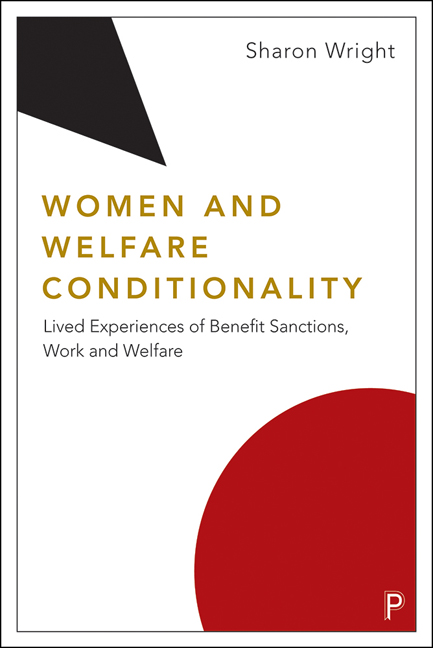Book contents
- Frontmatter
- Contents
- List of figure, tables and charts
- List of abbreviations
- Acknowledgements
- one What does work-based welfare reform mean for women?
- two Re-theorising conditional welfare as gendered lived experience and street-level practice
- three Policy context: the hidden gendered impacts of conditional welfare reforms
- four Rewriting retirement as ‘work experience’: older women’s gendered encounters with the work ethic
- five Crushing conditionality: women living through heavily enforced work-related conditionality
- six In the shadow of sanctions: disciplining women and children for violating male-defined work norms
- seven Conclusions
- Appendix 1 The Welfare Conditionality study
- Appendix 2 Sanctions overviews
- Notes
- References
- Index
one - What does work-based welfare reform mean for women?
Published online by Cambridge University Press: 27 March 2024
- Frontmatter
- Contents
- List of figure, tables and charts
- List of abbreviations
- Acknowledgements
- one What does work-based welfare reform mean for women?
- two Re-theorising conditional welfare as gendered lived experience and street-level practice
- three Policy context: the hidden gendered impacts of conditional welfare reforms
- four Rewriting retirement as ‘work experience’: older women’s gendered encounters with the work ethic
- five Crushing conditionality: women living through heavily enforced work-related conditionality
- six In the shadow of sanctions: disciplining women and children for violating male-defined work norms
- seven Conclusions
- Appendix 1 The Welfare Conditionality study
- Appendix 2 Sanctions overviews
- Notes
- References
- Index
Summary
It’s February 2015 and I’ve travelled north by train between snowy mountains to speak to Michelle, a 23-year-old single woman getting Universal Credit. We settle down in a confusingly repurposed room – recording studio in one corner, desk and chairs in the other – in a hidden corner of an anonymous community centre. Seagulls squawk through the skylight. Michelle is animated. Her pale eyes sparkle as she tells me of her enchantment with the new payment, which is “much better” than Jobseeker’s Allowance. She’s out of work now but boasts an impressive array of vocational qualifications for realistic-sounding job options – hairdressing, interior decorating – and has recent supermarket and call-centre work experience. Michelle is worried about “being sanctioned, basically not having any money”. She recently got a letter from the Jobcentre asking why she missed an appointment. It left her “a bit confused because I honestly cannot remember having an appointment at that time and that date”, which was during a period when she was doing a full-time employability training course. Once she explained, she wasn’t sanctioned. She says: “I really want to find a job, because I’m so sick of not working; I really am.”
In 2016, a soaked train rushes me back to meet Michelle again. We’re in a bigger room, in the same complex. Since we last met, Michelle got a cleaning job at a supermarket, 16–20 hours per week, but it didn’t last. A psychiatrist was assessing her during that time:
‘I told my boss – I opened up to him, told him everything, that I thought I may have been schizophrenic or something. … It came to an end partly because of the way I was feeling, but also because he actually – he was discriminative of me. And I resigned in the end because I just couldn’t cope.’
Michelle’s mental health problems are now diagnosed. She now has a zerohours contract with a community centre but hasn’t had any shifts yet and she volunteers at a charity shop. She wants to get a nursing degree. “That’s the only thing that prevents me from working sometimes. I’ve got borderline personality disorder. And I suffer with anxiety and depression, so it makes things really, really hard. Sometimes unbearable. … Medicines can’t take it away; they can only manage it.”
- Type
- Chapter
- Information
- Women and Welfare ConditionalityLived Experiences of Benefit Sanctions, Work and Welfare, pp. 1 - 15Publisher: Bristol University PressPrint publication year: 2023

